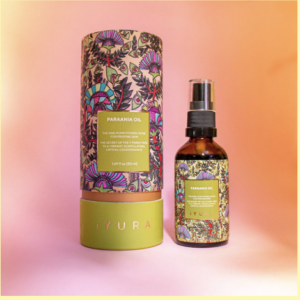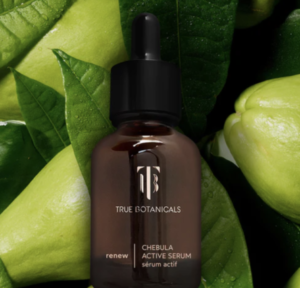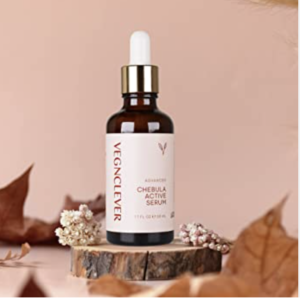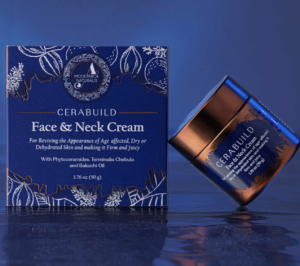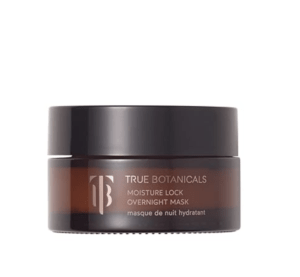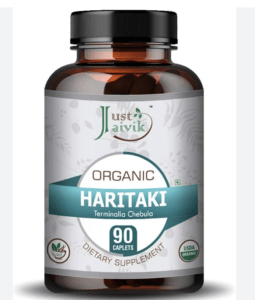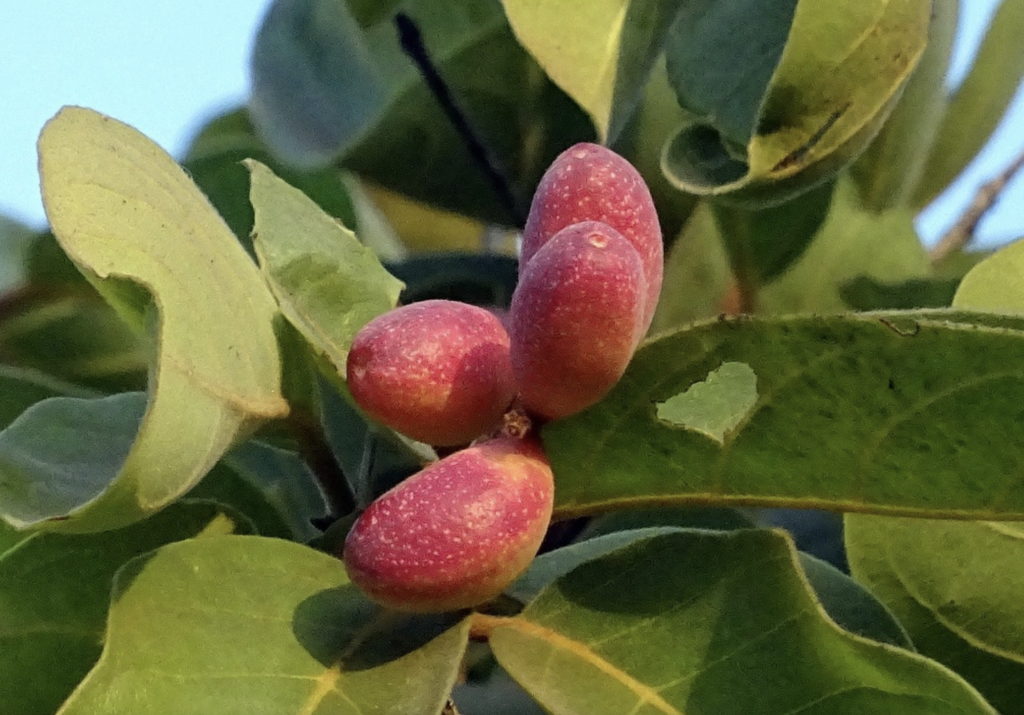
Jump To Section
Terminalia Chebula
Chebula, also known as Terminalia chebula, is a plant species that belongs to the Combretaceae family. It is native to Southeast Asia and India, where it’s been used for thousands of years in Ayurvedic medicine to treat TONS of health conditions. 
The fruit of the Chebula plant, also known as Haritaki, is the most commonly used part of the plant in Ayurvedic medicine. It is a small, yellowish-green fruit that grows on the tree, harvested in the autumn months.
The fruit is rich in phytochemicals, including tannins, flavonoids, and polyphenols, responsible for its many health benefits. Here are some of the health benefits of Chebula:
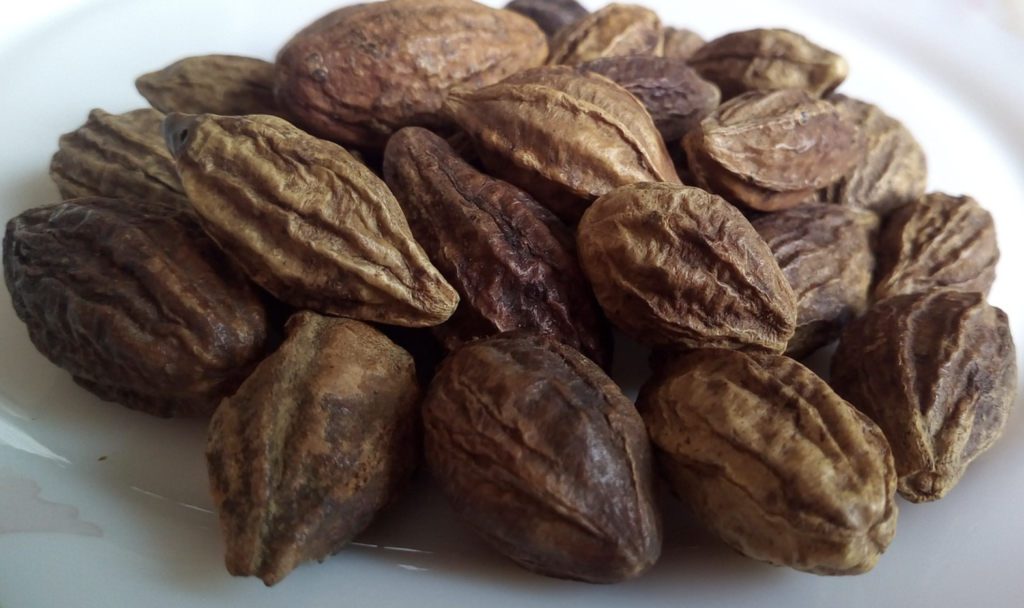
7 Chebula Benefits For Healthy Living
- Digestive Health: Chebula has been traditionally used to treat a wide range of digestive issues, including constipation, diarrhea, and dysentery. The tannins in the fruit have astringent properties that help to tone and strengthen the intestinal walls, reducing inflammation and promoting regular bowel movements.
- Respiratory Health: Chebula is also used to treat respiratory issues like asthma, bronchitis, and coughs. It helps to soothe the mucous membranes of the respiratory tract, reducing inflammation and promoting easier breathing.
- Anti-inflammatory properties: Chebula has potent anti-inflammatory properties, which makes it useful for treating inflammatory conditions like arthritis, gout, and skin conditions like eczema and psoriasis.
- Antioxidant properties: Chebula is rich in antioxidants, which help to protect the body against free radicals and oxidative stress. This makes it useful for reducing the risk of chronic diseases like cancer, heart disease, and Alzheimer’s disease.
- Immune system support: Chebula has immune-modulating properties that help boost our immune system’s function. This can help to reduce the risk of infections and other immune-related health conditions.
- Oral Health: Chebula is also used in Ayurvedic medicine to improve oral health. It has antimicrobial properties that help fight oral bacteria, reducing the risk of cavities and gum disease.
- Liver Health: Chebula has been traditionally used to support liver health. It helps to protect the liver against damage from toxins and oxidative stress, promoting liver detoxification and overall liver function.
Chebula can be consumed in a variety of forms, including as a powder, capsule, or tincture. It is also commonly used as an ingredient in Ayurvedic formulations.
However, it is important to note that while Chebula is generally considered safe when consumed in moderation, it can cause side effects like stomach upset and diarrhea when consumed in large amounts.
Additionally, people with certain health conditions should exercise caution when consuming Chebula, including pregnant or breastfeeding women, people with bleeding disorders, and people taking blood-thinning medications.
With that said, Chebula is a powerful medicinal plant with a long history of use in Ayurvedic medicine. Its potent anti-inflammatory, antioxidant, and immune-modulating properties make it pretty damn useful for any of us guys n gals treating a variety of health conditions, from digestive issues to respiratory issues and more.
However, as with any herbal supplement, it’s also important to consult with a healthcare practitioner before using Chebula, especially if you have any underlying health conditions or are taking any medications. With the right steps, Chebula can be a valuable addition to your natural health toolkit. Check out Our #1 rated Chebula Supplement Here. So what about Chebula for skin care?
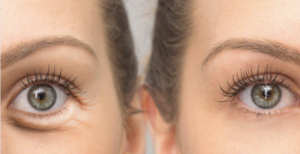
Chebula For Skin Care
Well… Chebula, or as I like to call it, the “Haritaki Houdini,” is a mystical fruit that has been used in traditional medicine for centuries. And while it may not be able to pull a rabbit out of a hat, it does have some serious tricks up its sleeve when it comes to skincare.
So, what exactly is Chebula when it comes to skin care? Well, this small, yellowish-green fruit grows on a tree in Southeast Asia and India. But don’t let its size fool you – this fruit packs a punch! Especially when it comes to skincare.
Here are five key benefits of Chebula for skin:
- Anti-aging properties: Chebula is rich in antioxidants, which help to protect the skin from free radical damage and slow down the aging process. So, if you want to keep your skin looking young and fresh, Chebula is your new best friend.
- Brightening effects: Chebula is also known for its brightening effects on the skin. It helps to even out skin tone and reduce the appearance of dark spots and pigmentation. So, if you want to get that coveted “lit from within” glow, Chebula is the way to go.
- Acne-fighting abilities: Chebula has antimicrobial properties that help to fight acne-causing bacteria. It also helps to reduce inflammation and soothe irritatedskin, making it a great natural remedy for acne-prone skin.
- Hydrating properties: Chebula is a natural humectant, which means it helps to draw moisture into the skin and keep it hydrated. This is especially important for dry/dehydrated skin, as it can help to plump up the skin and reduce the appearance of fine lines and wrinkles.
- Soothing effects: Chebula has a calming effect on the skin, making it great for sensitive or irritated skin. It helps to reduce redness and inflammation and soothe any irritation or discomfort.
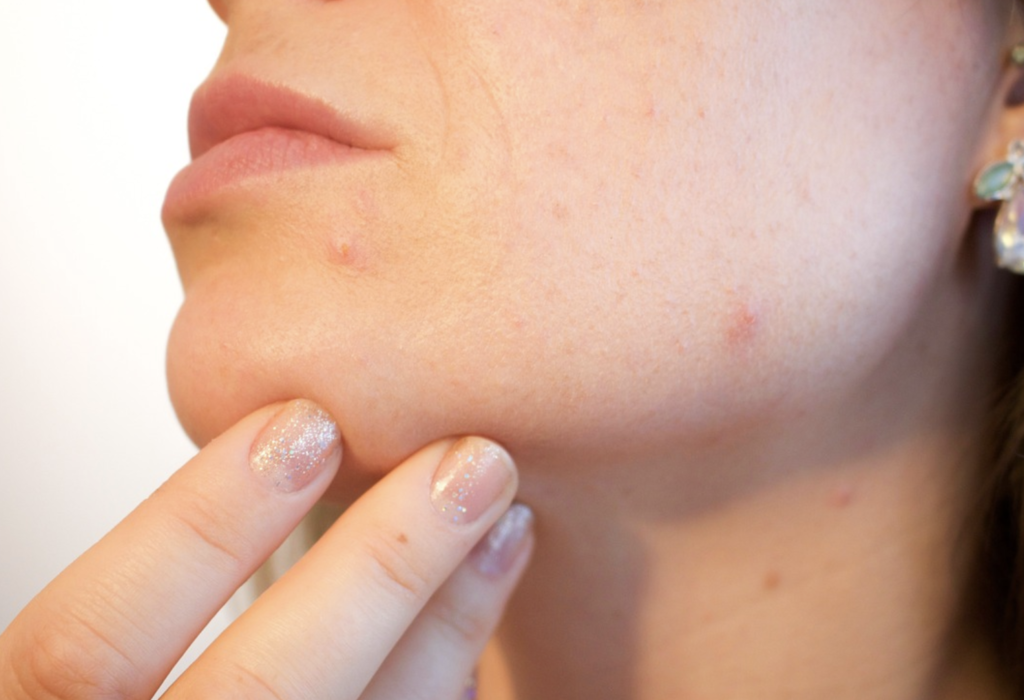
How To Use Chebula – Tips On Applying
Now, you might be thinking, “But how do I even use Chebula on my skin?” Well, fear not, my friends. Chebula comes in a variety of forms, including powders, serums, creams, extracts, and oils, so there’s something for everyone (see our top chebula reviews & product recommendations). You can mix the powder with water to create a paste and apply it directly to your skin, or you can look for skincare products that contain Chebula extract or oil. Here’s a brief video demo on how to apply the Chebula Active Serum to your skin:
But before you go slathering Chebula all over your face, it’s important to do a patch test to make sure you’re not allergic or sensitive to it. And as with any new skincare product, it’s always a good idea to start slowly and see how your skin reacts before using it more frequently.
Now look, Chebula may not be able to perform magic tricks, but it certainly has some impressive skincare benefits. From anti-aging and brightening effects to acne-fighting and soothing properties, this little fruit is a true skincare superhero. So, if you’re looking for a natural, effective way to take care of your skin, give Chebula a go. Your skin (and your inner magician) will thank you!
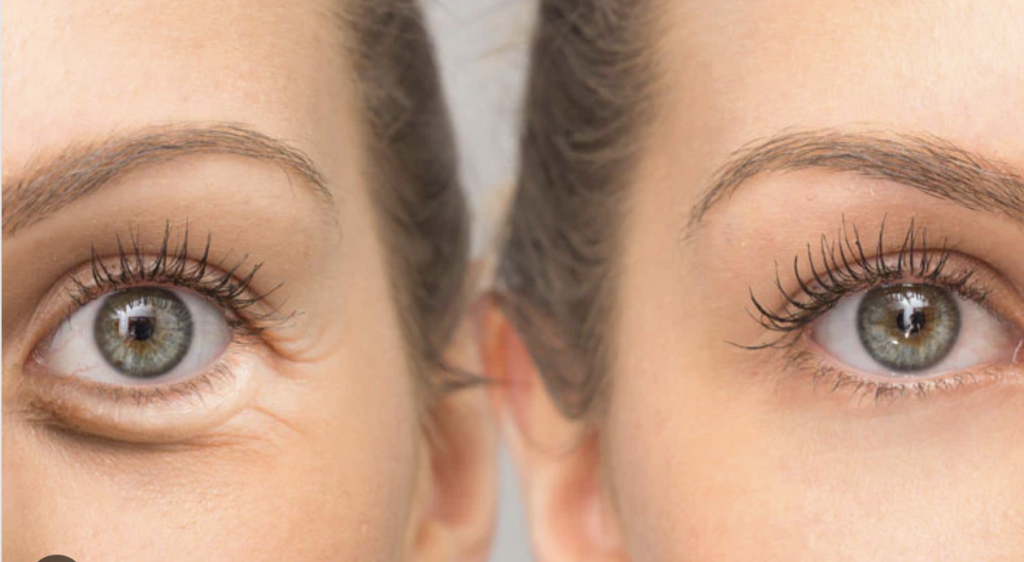
Chebula Side Effects & How To Avoid Them
While Chebula is generally considered safe, it is essential to be aware of its potential side effects and how to avoid them.
- One of the most common side effects of Chebula is diarrhea. This can happen when Chebula is consumed in large amounts, or when it is taken by someone with a sensitive stomach. Diarrhea can lead to dehydration, so it is important to drink plenty of fluids to avoid this side effect. To prevent diarrhea, it is recommended to start with a small dose of Chebula and gradually increase it over time. If diarrhea persists, it is best to stop taking Chebula and consult with a healthcare professional.
- Another potential side effect of Chebula is abdominal discomfort. This can manifest as cramping, bloating, or gas. These symptoms are usually mild and will subside on their own. However, if they persist or become severe, it is best to consult with a healthcare professional. To avoid abdominal discomfort, it is recommended to take Chebula after meals and to drink plenty of water throughout the day.
- Chebula can also cause a drop in blood sugar levels, which can be dangerous for people with diabetes. If you have diabetes, it is important to monitor your blood sugar levels closely when taking Chebula. It is also recommended to consult with a healthcare professional before taking Chebula if you have diabetes.
- In rare cases, Chebula can cause an allergic reaction. Symptoms of an allergic reaction can include itching, hives, swelling, and difficulty breathing. If you experience any of these symptoms after taking Chebula, it is important to seek medical attention immediately. To avoid an allergic reaction, it is recommended to start with a small dose of Chebula and to stop taking it if any symptoms of an allergic reaction occur.
- Lastly, Chebula can interact with certain medications. If you are taking any medications, it is important to consult with a healthcare professional before taking Chebula. Chebula can interact with medications that are metabolized by the liver, such as statins, antidepressants, and blood thinners. It can also interact with medications that lower blood sugar levels, such as insulin and oral hypoglycemic agents.
To avoid any potential side effects of Chebula, it is recommended to take it under the guidance of a healthcare professional. It is also important to purchase Chebula from a reputable source to ensure its quality and purity. Chebula should be stored in a cool, dry place and away from direct sunlight.
Chebula is a powerful herb with many therapeutic properties. While it is generally safe, it is essential to be aware of its potential side effects and how to avoid them. If you experience any side effects after taking Chebula, it is important to stop taking it and consult with a healthcare professional. By taking Chebula responsibly, you can enjoy its many benefits while minimizing the risk of side effects.
Chebula For Skin Side Effects:
Let’s break down the Chebula skin side effects and how to avoid them.
Chebula has various active compounds, including tannins, chebulic acid, and gallic acid. These compounds have been found to have antioxidant and anti-inflammatory properties, which make Chebula beneficial for the skin. Chebula can help improve skin health by reducing inflammation and oxidative stress, which can lead to premature aging and skin damage. However, when used in large quantities, Chebula can have adverse effects on the skin.
One of the most common Chebula skin side effects is skin dryness. Chebula can cause excessive dryness and flakiness of the skin, which can make it look dull and lifeless. To avoid this side effect, it is essential to use Chebula in moderate amounts and to moisturize the skin regularly. Use a good quality moisturizer that suits your skin type to prevent excessive dryness.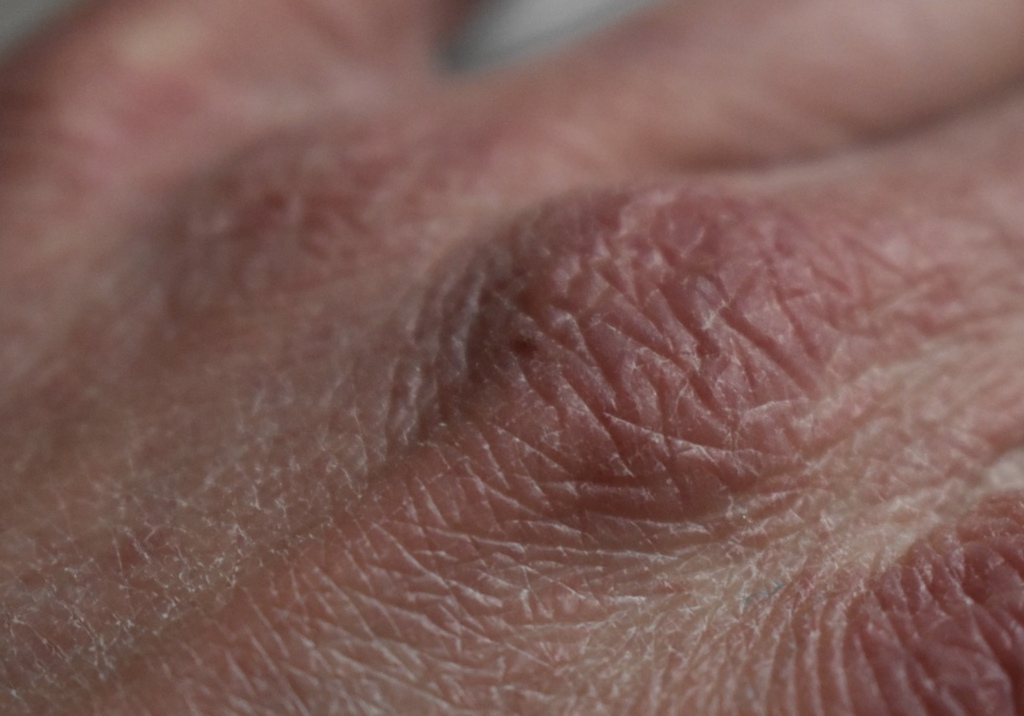
Another Chebula skin side effect is skin irritation. Chebula can cause skin irritation, redness, and itching in some people. This side effect is more common in people with sensitive skin. To avoid skin irritation, it is essential to perform a patch test before using Chebula on the skin. Apply a small amount of Chebula paste on the inside of your elbow and wait for 24 hours. If you notice any redness, itching, or swelling, do not use Chebula on your skin.
Chebula can also cause photosensitivity in some people. Photosensitivity is a condition in which the skin becomes more sensitive to sunlight. Chebula can increase the risk of sunburn and skin damage when exposed to sunlight. To avoid this side effect, it is essential to avoid direct sunlight after using Chebula on the skin. Wear protective clothing and use a good quality sunscreen with SPF 30 or higher when you go out in the sun.
Chebula can also cause skin discoloration in some people. Chebula contains tannins, which can cause skin discoloration and pigmentation when used in large quantities. To avoid skin discoloration, it is essential to use Chebula in moderate amounts and to avoid using it on sensitive areas of the skin, such as the under-eye area.
Chebula is a beneficial herb for the skin, but it can also have adverse effects when used in large quantities or for an extended period. Chebula skin side effects include skin dryness, skin irritation, photosensitivity, and skin discoloration. To avoid these side effects, it is essential to use Chebula in moderate amounts and to perform a patch test before using it on the skin. Moisturize the skin regularly, wear protective clothing, and use a good quality sunscreen to avoid skin damage and photosensitivity. If you experience any adverse Chebula skin side effects, stop using it immediately and consult a dermatologist.
In conclusion, Chebula Is amazing when used properly and If you’re an avid believer in overall natural, organic health, Chebula is for you!
[wp-post-author]
For more on Chebula reviews click here
FAQ: Does Chebula Serum Really Work? (Read More)
Chebula Where To Buy ? (Read More)
For more information check out our homepage here
